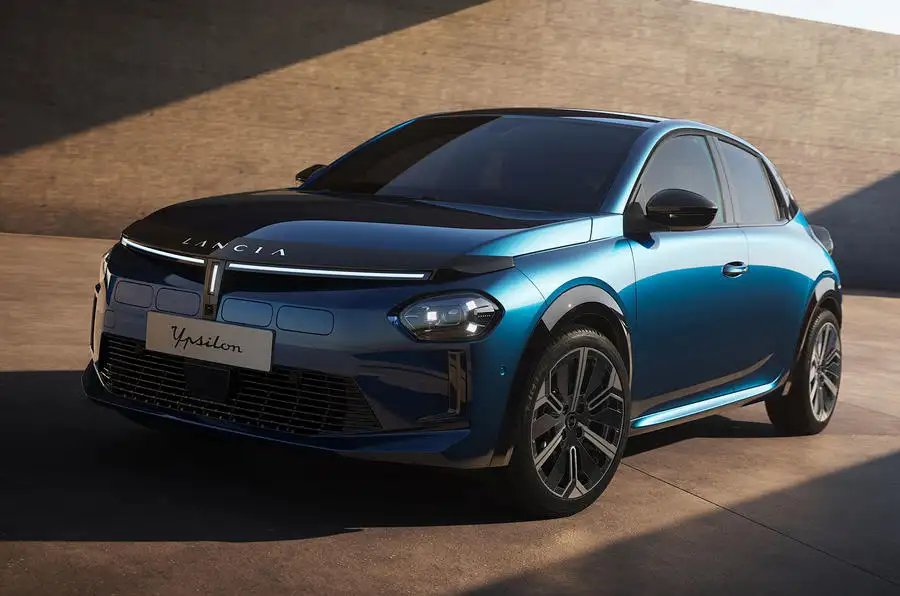New electric Ypsilon city car is Lancia's last bid for relevance

Stellantis-owned Lancia has unveiled its first new model in well over a decade. Offered only with an electric drivetrain, the new Ypsilon is a small, premium four-door hatchback developed to make the 118-year-old Italian brand relevant again after an extended period of decline.
We shouldn't be writing this story, because Lancia shouldn't be around to release a new Ypsilon. Sergio Marchionne, the CEO of Fiat-Chrysler Automobiles until his death in 2018, planned to close the brand. It was too small, too heavily reliant on the European market, and ultimately more of a burden than anything else. He executed his plan gradually: first, he tried giving Lancia a handful of Chrysler models to sell in Europe, which didn't work. Then, he gradually pulled the plug on Lancia's range and foreign operations, leaving the company with a single model (the last-generation Ypsilon) to sell in a single country (Italy). Rewind to the 1990s, and that's exactly how Autobianchi shut down.
History didn't repeat itself this time. Stellantis executives decided to give every brand in the group a chance to prove why it deserves to exist.
The third-generation Lancia Ypsilon (we're counting the Y launched in 1995 as the original) is Lancia's first argument. Having access to its parent company's parts bin helped keep development costs in check, and the hatchback shares its Common Modular Platform (CMP) with other small hatchbacks you'll see meandering across Europe such as the Peugeot 208 and the Opel Corsa. Visually, it borrows a handful of styling cues from the Pu+Ra HPE concept unveiled in 2023, like low-mounted headlights and three thin strips of LEDs on the front end. Out back, you'll find a pair of round headlights ostensibly inspired by the ones fitted to the Stratos, a coupe that cemented Lancia's reputation as a force to reckon with in the World Rally Championship (WRC) during the 1970s. That's as much of Lancia's rallying heritage the brand chose to channel, however.
Instead, it's highlighting the upmarket chapter of its history: for decades, the brand was associated with luxury rather than with performance. Italian presidents rolled around in purpose-built Flaminia sedans in the 1960s. Rallying was the brand's claim to fame in the 1970s and the 1980s, and Lancia unceremoniously became associated with badge-engineering during the 1990s. This is where its decline began.
The new Ypsilon's job is to reverse it by giving buyers a more stylish alternative to, say, the 208 it's based on. Inside, the driver faces a three-spoke steering wheel, a 10.25-inch digital instrument cluster, and a 10.25-inch touchscreen for the infotainment system. Some variants, including the limited-edition Cassina model pictured in our gallery, come with what Lancia calls a tavolino (which means "small table" in Italian) on the center stack that designers added to make the cabin feel a little like a living room. It also integrates a wireless phone charger.
Equipment varies on the trim level selected, but customers can configure the Ypsilon with features not commonly found in small cars on the European market. Adaptive cruise control and heated front seats with a massage function underline the hatchback's upmarket aspirations.
Power for the Lancia Ypsilon comes from a front-mounted electric motor that draws electricity from a 51-kilowatt-hour lithium-ion battery pack to zap the front wheels with 156 horsepower. Lancia quotes a maximum driving range of about 250 miles on the WLTP testing cycle used in Europe, which tends to lean towards the optimistic side of the scale. And, while the Ypsilon will be electric-only at launch, that doesn't mean it will stay that way forever. Stellantis-owned brands have a track record of quietly releasing gasoline-powered variants later in the production run. However, the company has made it clear that every car it releases starting in 2026 will be exclusively powered by an electric drivetrain.
Lancia is overhauling its dealer network in Italy to prepare for the new Ypsilon's launch. It's also counting on the hatchback to enter some of the European markets it left during the 2010s, including Belgium, Holland, France, Spain and Germany. This expansion will take place by 2025. It chose markets with a positive view of Italian products, an openness to buy cars online, and a healthy appetite for small, city-friendly hatchbacks. Nothing suggests we'll see the new Ypsilon (or any upcoming product from the Lancia brand) in the United States, however.
As of writing, the only variant of the new Ypsilon detailed is the aforementioned limited-edition model, which starts at €39,500 (about $42,500 at the currently conversion rate) in Italy. Alternatively, with that money you can put a new BMW 1 Series hatchback in your garage and still have money left over for a pair of skis, a roof rack, and a long weekend in the Alps. If you shop at Peugeot, you can get a base 208 for €16,820 (roughly $18,100) or the electric e-208 for €29,130 (around $31,400). Lancia is clearly shooting for a niche with the new Ypsilon.
Verwandte Nachrichten
